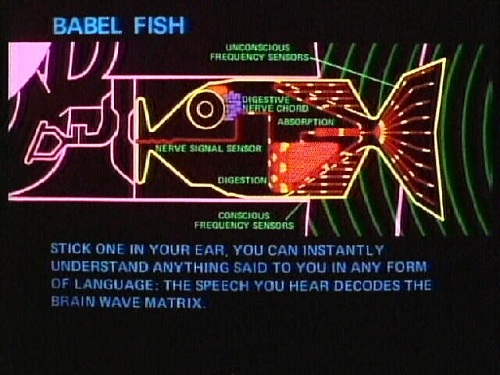
By Chris Scott Barr
If you’ve never read The Hitchiker’s Guide to the Galaxy, I’d suggest picking it up. No, watching the movie definitely doesn’t count. One of the coolest ideas (of which there were many) in the book was the Babel Fish. It was a fish that was inserted into your ear, and magically translated any spoken language into one that you would understand. If the name sounds familiar, it’s because Yahoo has a text translation service that shares the name.
So why am I babbling about the Babel Fish today? Because it would seem that Google is working on a bit of technology that will work in a similar way (but thankfully without inserting a fish in your ear). Their new speech-to-speech translator will take a person’s words and translate them on-the-fly while on their phone. The software would be installed on the speaker’s end, so that it can adapt over time to the person’s individual voice and speaking patterns, thus resulting in a better translation.
It would seem that this software is still in an early development stage, understandably so. As it is, their speech-to-text translations via Google Voice are laughable. My most recent message was from someone at “James Dot” telling me that my copy of “I Was Shocked” was in, and reminding me that I could bring some “James” to trade in towards the price. (The key words mis-translated were GameStop, Bioshock and Games, for those playing along at home.) Needless to say, I hadn’t the slightest clue who had called until I listened to the message.
VIA [ TimesOnline ]





James Dot is an awesome alias, but like everything else on the internet, it's already an adult only website.
I think I'll call up 411 asking for James Dot, and start hounding poor sap with that name for release dates of vaporware.
The google thing is good for helping other people understanding you, but what does it do to help you understand them? Are they purposely making it only work one way thinking that they would sell twice as many? It won't help because everyone will be reluctant to buy it, smart consumers would know it would be a useless waste of money unless all of the other people that they might ever want to talk to also bought one.
Google's “Babel Fish” translator will in never solve the language problem. Not only does it discriminate against anyone who cannot afford a mobile phone, but against minority language groups as well.
There are 6,800 languages worldwide, not fifty-two !
Moreover, if I met a native in Borneo, and he said to me in Hakka “I've lost my mobile phone” how would you understand him 🙂
And how many starving Africans can afford a mobile phone !
As English loses its economic power, the answer is not for us to move to Mandarin Chinese, but to Esperanto which puts all speakers on an equal footing.
Have a look at http://www.lernu.net or http://www.esperanto.net
Google's “Babel Fish” translator will in never solve the language problem. Not only does it discriminate against anyone who cannot afford a mobile phone, but against minority language groups as well.
There are 6,800 languages worldwide, not fifty-two !
Moreover, if I met a native in Borneo, and he said to me in Hakka “I've lost my mobile phone” how would I understand him 🙂
And how many starving Africans can afford a mobile phone !
As English loses its economic power, the answer is not for us to move to Mandarin Chinese, but to Esperanto which puts all speakers on an equal footing.
Have a look at http://www.lernu.net or http://www.esperanto.net
While it seems like a great idea, I just cannot see how it'd translate on the fly. Your conversation would be slow and filled with awkward pauses…
The idea is great for Google to dip in. They are part of everything there is to improve on. I look forward to the final output.
The idea is great for Google to dip in. They are part of everything there is to improve on. I look forward to the final output.
It is a nice feature but i guess google should introduce disqus for blogger.!!!
Very interesting article, thanks for sharing!